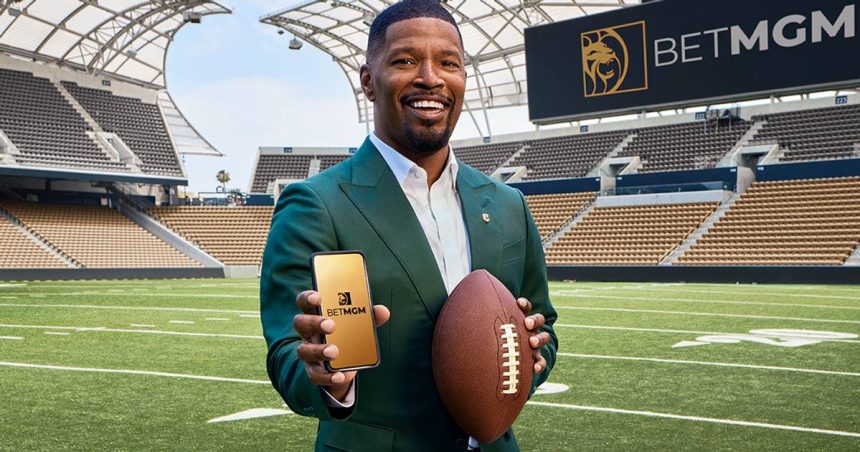Jamie Foxx in a wig. Kevin Hart clowning around with LeBron James. An urgent sense that there’s a giant pile of money free for the taking—if only the right parlay is placed.
This NFL season, sportsbooks are leaning on tried-and-true advertising strategies to entice new and old customers to pony up, and they’re buoyed by bigger ad budgets than last year.
DraftKings, FanDuel, and BetMGM, the three largest sportsbooks in the US, bought more linear TV ads from August 15 through the first three weeks of the NFL season this year than in the same period last year, according to data from measurement firm iSpot.
- DraftKings spent an estimated $36.4 million, up 22% compared to the same period last year.
- FanDuel spent an estimated $27.1 million, up 14%.
- BetMGM spent an estimated $11.5 million, just shy of its 2023 spend over the same time period.
As a whole, spending in the casinos and gambling category is up 13.5%, according to iSpot. (It’s worth noting here that iSpot only measures linear TV ads, and doesn’t factor in regional ads or ads on streaming platforms, where Amazon, Paramount, Peacock, and soon, Netflix, stream NFL games, or social media.)
The start of the NFL season, when even Jacksonville Jaguars fans are optimistic, is a critical time for sportsbooks, Matt Prevost, chief revenue officer of BetMGM, told Marketing Brew.
“This is when many sports-betting customers decide which brands they are going to bet with over the course of the season,” he said. “Industrywide, you’ll see more advertising in the month of September than you will see in any other month outside of the Super Bowl.”
Same old story
Creatively, the ads from sportsbooks this fall are largely more of the same, offering up various incentives to join their platforms with celebrity spokespeople. That includes bonus money to spend on their platforms, which BetMGM, DraftKings, and FanDuel are all offering, as well as free trials for streaming services like NFL+ and NFL Sunday Ticket. BetMGM worked with Foxx on its ads, while DraftKings worked with LeBron; FanDuel tapped Eric Andre to do his Eric Andre thing to pitch the promotions.
Get marketing news you’ll actually want to read
Marketing Brew informs marketing pros of the latest on brand strategy, social media, and ad tech via our weekday newsletter, virtual events, marketing conferences, and digital guides.
It isn’t all about promotions, though: In the last two weeks of August, DraftKings ran an ad for its Withdrawal Tracker feature, which as its name suggests, enables customers to see when any winnings will hit their bank accounts. The ad, which focuses less on the gambling element and serves as a reminder that there can be financial stakes to playing, has gotten only a miniscule amount of spend behind it since the season formally kicked off, according to iSpot data.
While spending is up this season, there hasn’t been the same promotion-ladden land grab as in years past, which could be due both due to the sheer size of sportsbook user bases and the fact that gambling has become legal in only two additional states, North Carolina and Vermont, this year, a slowdown from prior years.
This season, BetMGM has mixed up its advertising strategy to focus on retention, including promotions that might keep customers betting, Prevost explained. That includes offering a “second-chance” promotion, which functions as something of a pseudo-insurance policy if a customer’s first prop bet doesn’t land.
Prevost said he expects the company to increase its advertising investments, especially as it has been “playing a bit of catch-up ever since we started in 2019 in earnest” with more established brands.
“With [an] improved product, we feel more comfortable investing in marketing, so you will see BetMGM more prominent than we have been in years past,” he said.
Zoom out: Sports betting in the US continues to grow, with Goldman Sachs Research estimating that the industry could eventually bring in around $45 billion every year once the market matures. Sports bettors tend to be young, male, and wealthy, and as sports gambling becomes more mainstream, so are calls to problem gambling centers, some of which are raising the alarm. One study found that Black sports bettors had over twice the rate of disordered gambling compared to their white counterparts.
Read the full article here










